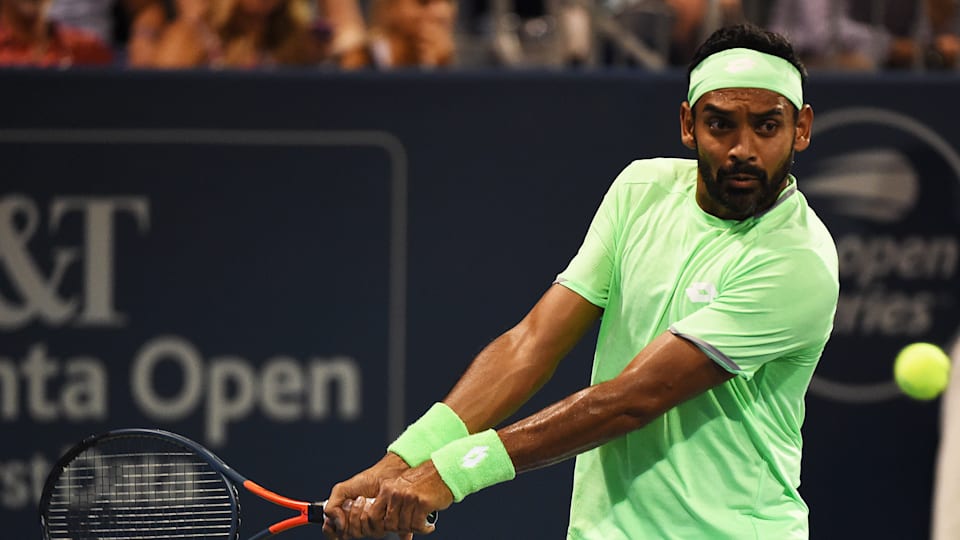Lone Ranger: Divij Sharan gets a helping hand for the Australian Open
In a season of uncertainties, the Indian doubles specialist is enjoying the rare luxury of a travelling coach at the Melbourne major

Divij Sharan didn’t quite suffer the fate of fellow Indian Rohan Bopanna – who was locked up in a room with nothing but a wall to look at for 15 days during quarantine ahead of the Australian Open. But the lonely struggle of his sport has manifested a various different forms in the post-pandemic era.
Uncertain tournament schedules, scrambling for doubles partners, poring over Covid-19 restrictions in every country he is supposed to play in and figuring out the quarantine protocols. The 34-year-old tackled all of that on his own. Even something as simple as off-season training didn’t quite go to plan.
“I was in New Delhi for five-six weeks (at the end of 2020),” says the Indian doubles specialist, who will compete at the Australian Open starting on Monday, over the phone from Melbourne.
“I did take some time off but then I was training at Siri Fort. I practised mostly with (Indian player) Yuki (Bhambri). Then I was planning to train in UK. I did go there but then they went into extreme lockdown so the courts were shut. Then I went to Dubai to train for about 10 days before heading to Australia. I was pretty much on my own. I was sparring with one of my friends there but I was doing my fitness on my own. I had access to a gym and fitness on court.”
At 64, Sharan is the second-highest ranked doubles player from India. And despite winning five ATP Tour doubles titles and making the quarterfinals at Wimbledon in men’s doubles he manages to fly under the radar.
Having turned pro in 2004, the Delhi-native has usually kept his struggles on tour to himself. The southpaw, with a steady serve and a forecourt game that harks back to the glory days of Indian tennis, made the transition to doubles around 2012. He reached a career high of 36 in 2018.
But 2020 has placed so many of us out of our comfort zone. And for tennis players, pursuing a truly world sport during a global pandemic, has posed its own challenges.
“It’s not been easy with a lot of things,” Sharan says.
“Usually, on the ATP Tour, you’d have two-three tournaments every week. That has cut down; tournaments have been cancelled. Cut-offs have been much higher, so it’s not easy to fix with somebody (doubles partners). There’s a lot of shifting and switching. I had to play with a lot of different partners last year. Then there are entry restrictions for different nationalities.
“After the Australian Open, I am not sure where I am going to play. There are a couple of options, but I have to see where I can go without having any issues. It’s a new situation, it’s tricky for everyone. Everyone is just trying to make the best of what they can.”
Once the tour resumed in August 2020, after a six-month hiatus due to Coronavirus, Sharan competed in 10 tournaments with eight different partners. For the Australian Open, he has teamed up with 38-year-old Slovak Igor Zelaney.
Sharan had Zelaney had won the St Petersburg Open in 2019 and resumed their partnership at the end of last year. They played the Australian Open warm-up event, Murray River Open, this week but were knocked out in the second round by fifth seeds Fabrice Martin and Jeremy Chardy.
But Sharan believes he was one of the ‘luckier’ players, who did not have to undergo hard quarantine in Melbourne and could put in the hard yards along with his partner.
“We’ve got a good couple of weeks of training going into the Australian Open,” he says. “I had not played any matches since the beginning of November. So the idea was to get match sharp and peak at the Australian Open. I do believe we can do really well here.”
The bonus for Sharan is that he has his coach with him for the duration of the Australian Open. Paul Dale, a Kiwi based in Thailand, will be helping the Indian in Melbourne.
“I have worked with him in the past and sort of kept in touch with him,” says Sharan. “Last year I was travelling by myself because of all the restrictions. He was available for this time period.”
For a lot of players on the pro tour, having a coach, which is usually a given for an athlete, is a luxury.
“It makes a big difference (to have a coach),” he says. “We are travel quite a bit. So it gets expensive to have a regular travelling coach. It’s about more than doubles, because you are taking care of two people’s expenses plus the fees. So it’s not that feasible.
“But if you do have the option of having a coach it makes a big difference: your practice sessions are a bit organized, there’s always someone there to support. It’s easier for someone watching from the outside to give their input because sometimes you miss out on things. Obviously you have a support structure. Sometimes when things aren’t going great, you have somebody to speak with. Somebody to guide you.”
Sharan will be hoping to make the most of Dale’s insight and Zelaney’s experience as he prepares for the Australian Open. The Indian’s best performance at the Slam came in 2018, when he made the pre-quarterfinals in men’s doubles.
Sharan-Zelaney will take on German pair of Yannick Hanfmann and Kevin Krawietz in the opening round of Australian Open.
